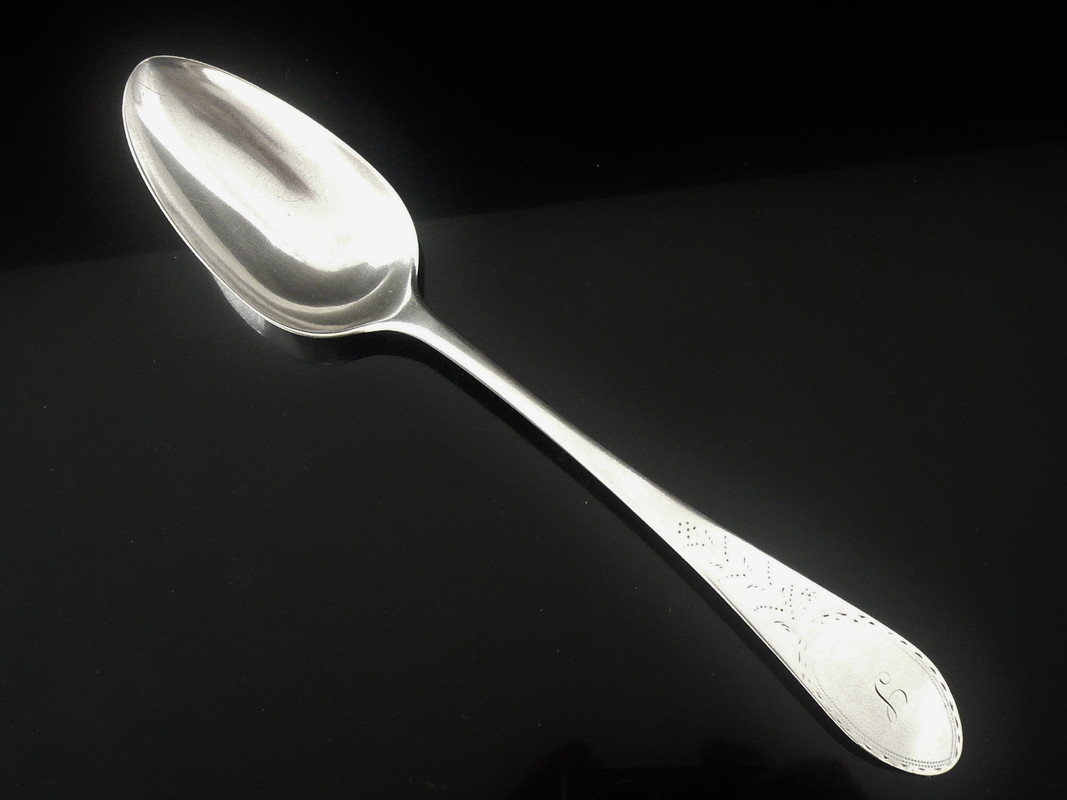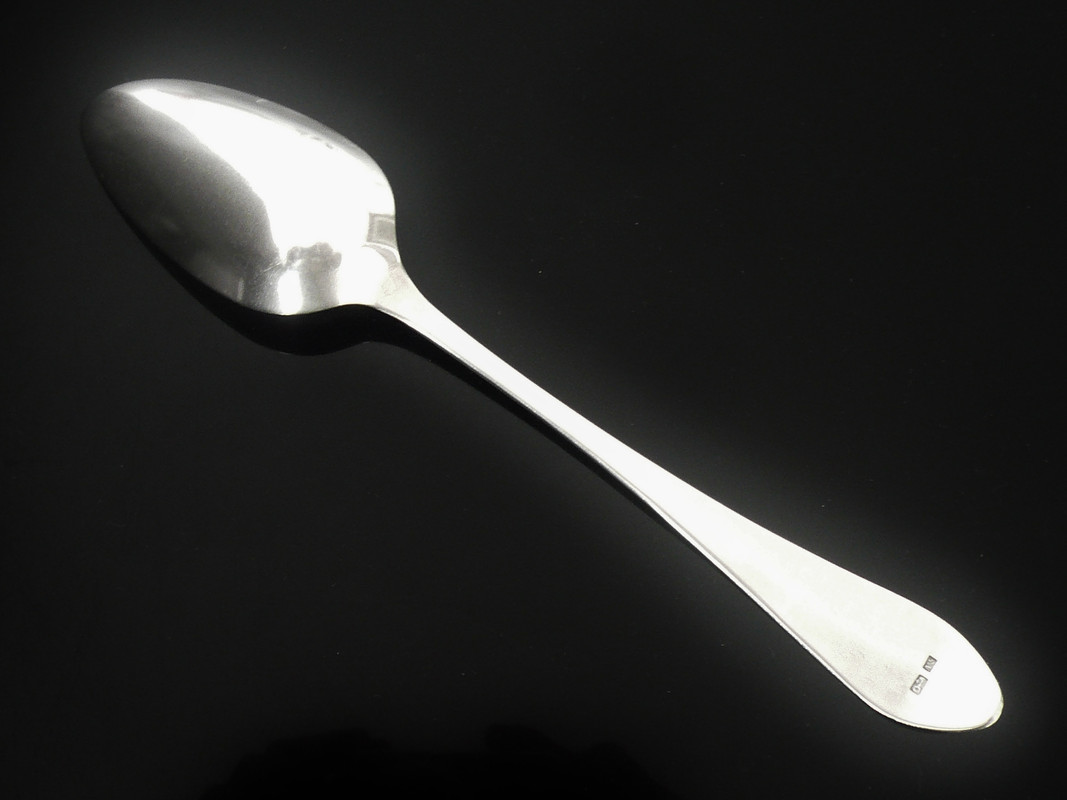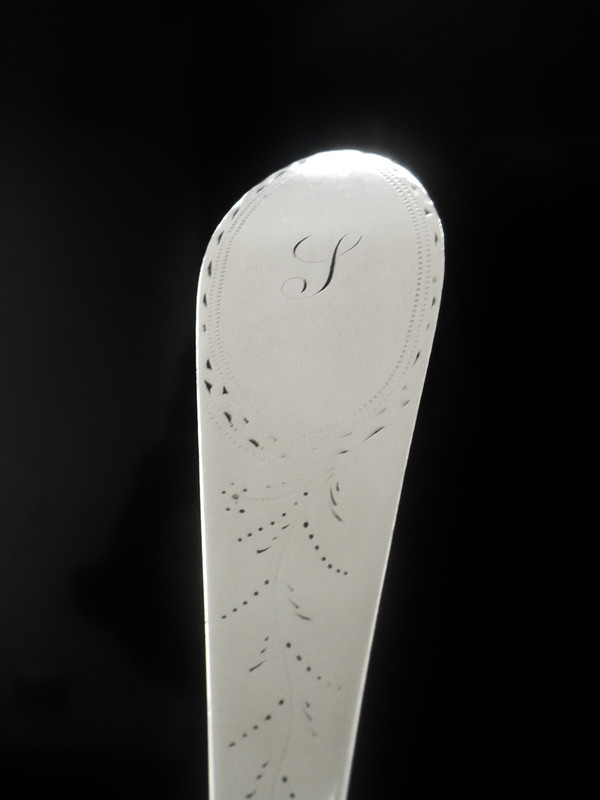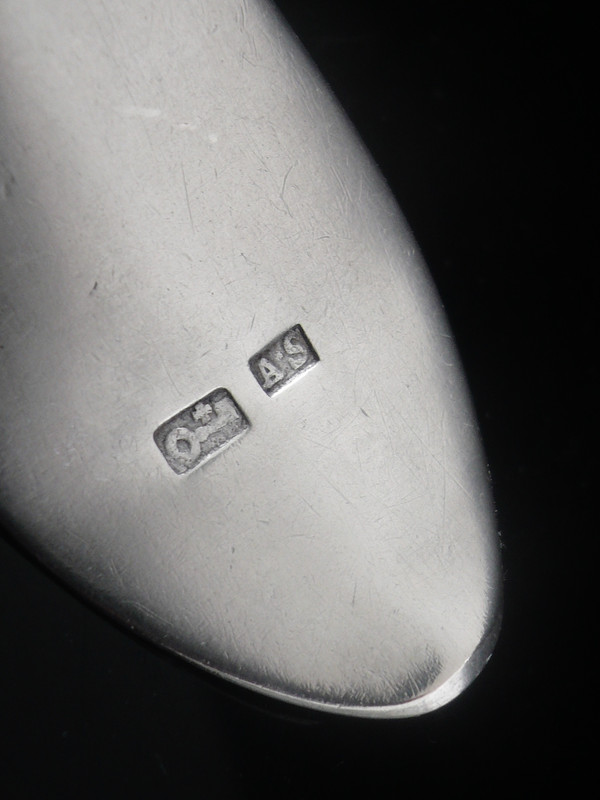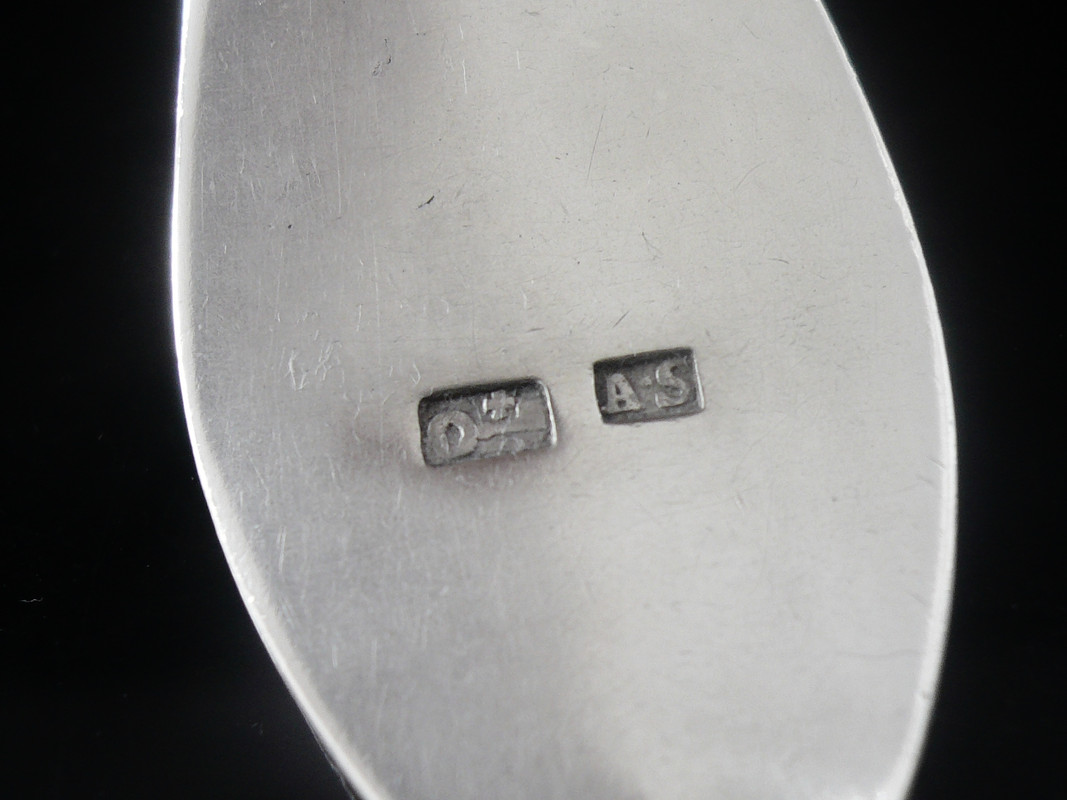Baltic silver
Re: Baltic silver
Thank you Ubaranda and Silverstone for that extra information.
I note the references to Captains spoons, which helps me as I have one of those as well.
Thanks again to all who have helped me.
Silverk.
I note the references to Captains spoons, which helps me as I have one of those as well.
Thanks again to all who have helped me.
Silverk.
Re: Unknown Marks on Spoon
Perhaps the townmark of Pärnu in Estonia 18th century
https://parnu.ee/en/home/symbols-of-parnu
Peter.
Source Mark Rosenberg, Band IV
https://parnu.ee/en/home/symbols-of-parnu
Peter.
Source Mark Rosenberg, Band IV
-
Silverstone
- contributor
- Posts: 147
- Joined: Fri Jan 14, 2022 8:41 am
- Location: Germany
Re: Unknown Marks on Spoon
Hi Colin,
Peter's tip was very useful.
“A·S”
... Andreas Sperl arrived at Pärnu from Turku (Swedish: Åbo) in Finland and was made a Pärnu citizen on 14 March 1802. …
Sperl died on January 19, 1841, aged 71...
Source: Beyer, Jürgen, Andreas Sperl, maker of captain’s spoons at Pärnu (Pernau) from 1802 to 1841, published 2010

Source: Hõbedamärgid Eestis, Alur Reinans, Tallinn, 2005, p.78 No. 39
Reagards
Silverstone
Peter's tip was very useful.
“A·S”
... Andreas Sperl arrived at Pärnu from Turku (Swedish: Åbo) in Finland and was made a Pärnu citizen on 14 March 1802. …
Sperl died on January 19, 1841, aged 71...
Source: Beyer, Jürgen, Andreas Sperl, maker of captain’s spoons at Pärnu (Pernau) from 1802 to 1841, published 2010

Source: Hõbedamärgid Eestis, Alur Reinans, Tallinn, 2005, p.78 No. 39
Reagards
Silverstone
Re: Baltic silver
Hello Colin,
Peter is correct that the city mark is the one from Pernau.
And Silverstone is correct to point to the maker, Andreas Sperl. The first reference is to an article published in the magazine for spoon collectors, The Finial, written by Jürgen Beyer and published in Vol. 21/02, Nov.-Dec. 2010, pp. 9-11. The second reference is from A. Reinans, Hobedamärgis Eestis - Die Silbermarken Estlands, Eesti Keele Sihtasutus, Tallinn 2005, no. 39, p. 78.
There are two additional references to Andreas Sperl: A. Leistikow, Baltisches Silber, Nordostdeutsches Kulturwerk, Lüneburg 1996, p. 277 and K. Kirme, Eesti Hobe - Estnisches Silber, Kirjastus "Kunst", Tallinn 2000, no. 182, p. 270.
A final remark. It is not uncommon to find spoons from the Baltic area described as "Captain's Spoons". To be identified without doubt as such they must have an inscription of the merchant/ship's agent who gave it to the captain, and of the city and year when it was given. There *are* captain's spoons *without* inscriptions but they have instead an iron-clad provenance, i.e. they have been given directly by the descendants of the original recipient.
Regards,
Scotrab
Peter is correct that the city mark is the one from Pernau.
And Silverstone is correct to point to the maker, Andreas Sperl. The first reference is to an article published in the magazine for spoon collectors, The Finial, written by Jürgen Beyer and published in Vol. 21/02, Nov.-Dec. 2010, pp. 9-11. The second reference is from A. Reinans, Hobedamärgis Eestis - Die Silbermarken Estlands, Eesti Keele Sihtasutus, Tallinn 2005, no. 39, p. 78.
There are two additional references to Andreas Sperl: A. Leistikow, Baltisches Silber, Nordostdeutsches Kulturwerk, Lüneburg 1996, p. 277 and K. Kirme, Eesti Hobe - Estnisches Silber, Kirjastus "Kunst", Tallinn 2000, no. 182, p. 270.
A final remark. It is not uncommon to find spoons from the Baltic area described as "Captain's Spoons". To be identified without doubt as such they must have an inscription of the merchant/ship's agent who gave it to the captain, and of the city and year when it was given. There *are* captain's spoons *without* inscriptions but they have instead an iron-clad provenance, i.e. they have been given directly by the descendants of the original recipient.
Regards,
Scotrab
Re: Baltic silver
Thanks to all of you for your assistance.
As ever, very much appreciated
Regards,
Colin
As ever, very much appreciated
Regards,
Colin
Re: Baltic silver
Is this a captain's spoon by any chance? It was passed down to me by my grandmother who left Tallinn during World War II. On the back the engraving is "F.H. Tegeler" or "J.H. Tegeler", "3ten September 1856". The marks appear to be very worn. On the left is "AL" but the other two are illegible to me. Any assistance anyone can provide would be much appreciated!



Photo 1 (front):https://photos.app.goo.gl/egcYgYihEQzL3rZk7
Photo 2:(back):https://photos.app.goo.gl/Q6oE19Nn33aXz3Nh6
Photo 3:(marks/engraving):https://photos.app.goo.gl/bhxV1aGUuUmBHvQU7
The links do work, I'm not sure why the images won't load inline.



Photo 1 (front):https://photos.app.goo.gl/egcYgYihEQzL3rZk7
Photo 2:(back):https://photos.app.goo.gl/Q6oE19Nn33aXz3Nh6
Photo 3:(marks/engraving):https://photos.app.goo.gl/bhxV1aGUuUmBHvQU7
The links do work, I'm not sure why the images won't load inline.
Re: Baltic silver
Hi, welcome to the forum. Please embedded your images, for information how to attach and embedded images see:
https://www.925-1000.com/forum/viewtopic.php?t=42199
Peter.
https://www.925-1000.com/forum/viewtopic.php?t=42199
Peter.
Re: Baltic silver
Good morning Krista,
Your spoon ist not a captain's spoon but a spoon given to F. H. Tegeler for some occasion, birth, christening, wedding etc. on 3 September 1856.
AL is the mark of the goldsmith who made the spoon. The two following marks are unclear: I have to look in my references to see if I can find anything.
Regards
Scotrab
Your spoon ist not a captain's spoon but a spoon given to F. H. Tegeler for some occasion, birth, christening, wedding etc. on 3 September 1856.
AL is the mark of the goldsmith who made the spoon. The two following marks are unclear: I have to look in my references to see if I can find anything.
Regards
Scotrab
Re: Baltic silver
Thanks, Scott! Now I can stop researching sbipbrokers, haha.
The only JH Tegeler I know of was associated with setting up schools in Weissenstein/Paide in the 1830s-40s. Thanks to this forum I have figured out that Adolf Lundmann was a silversmith who worked for a while in Weissenstein, later in Reval/Tallinn. (And the only "AL" based on "DIE GOLDSCHMIEDE REVALS".) I tried to find a town Mark for Weissenstein. I don't think I am permitted to link to an auction listing but I saw a spoon listed as being by Lundmann in Weissenstein and the mark is a flag. This matches the middle stamp on my spoon if you orient it upside down. So I think that just leaves us with one mystery mark to go! I assume that will be an assayer's mark though it doesn't really look like one.
Re: Baltic silver
I think I found the maker.
He is Adolf Friedrich Lundmann (1827-1878) from Weissenstein, now Paide, a town 80km (50 miles) southeast of Reval.
Ref.: A. Leistikow, Baltisches Silber, Institut Nordostdeutsches Kulturwerk 1996, p. 338
K.Kirme, Eesti Hobe, Tallinn Kirjastus "Kunst" 2000, no. 198, p. 271.
https://i.postimg.cc/2Srmhyn8/Lundmann.jpg
The photograph of Lundmann's mark, just like yours, is from K. Kirmes book. Note in particular the third mark, after the town mark for Weissenstein. I can't make it out properly, tho'.
Regards,
Scotrab
He is Adolf Friedrich Lundmann (1827-1878) from Weissenstein, now Paide, a town 80km (50 miles) southeast of Reval.
Ref.: A. Leistikow, Baltisches Silber, Institut Nordostdeutsches Kulturwerk 1996, p. 338
K.Kirme, Eesti Hobe, Tallinn Kirjastus "Kunst" 2000, no. 198, p. 271.
https://i.postimg.cc/2Srmhyn8/Lundmann.jpg
The photograph of Lundmann's mark, just like yours, is from K. Kirmes book. Note in particular the third mark, after the town mark for Weissenstein. I can't make it out properly, tho'.
Regards,
Scotrab
Re: Baltic silver
We are obviously talking about the same person! Well done!
Regards,
Scotrab
Regards,
Scotrab
Re: Baltic silver
I forgot to mention...
The Friedenthal references you mention doesn't say *what* the town mark is, nor do any of the other two references I indicated. However, from the drawing of the mark in A. Leistikow's book it seem that Weissenstein's town mark was a tower, sideways, perhaps a reference to the octagonal tower of its castle.
Regards,
Scotrab
The Friedenthal references you mention doesn't say *what* the town mark is, nor do any of the other two references I indicated. However, from the drawing of the mark in A. Leistikow's book it seem that Weissenstein's town mark was a tower, sideways, perhaps a reference to the octagonal tower of its castle.
Regards,
Scotrab
Re: Baltic silver
Scotrab, thanks so much! I really appreciate your looking that up for me. Great that the same unidentified mark is next to the other two. And yes - good point - it could absolutely be a tower on its side.
Krista
Krista
Re: Baltic silver
Not sure if anyone has this information or not, but I would like to share it. A few weeks ago I got this beautiful serving set of 2 items, made in Latvia with makers mark (AH). I found a stamp on the box which probably stands for the makers initials: A. Hellwigs, who worked in city of Jelgava. In his last name there is letter W, that means that this item was made after the end of Russian Empire in 1917 and before Latvian language reformation in 1922.








